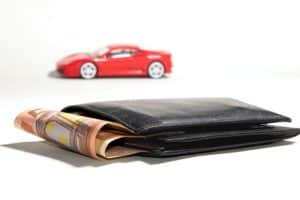Denis O’Brien [0:38]
Episode 191 Personal Finance Basics. Hey money clan, a very warm welcome to the Chain of Wealth podcast. I’m your host, Denis O’Brien.
Katie Welsh [0:50]
And I’m Katie Welsh.
Denis O’Brien [0:51]
So if you’re new to personal finance, this episode is definitely for you. So we’re going to be directing a lot of our new subscribers to this episode. So first off, welcome to Chain of Wealth.
Katie Welsh [1:1]
Yeah, welcome. We’re glad you’re here, we hope, at least a little bit of help to you.
Denis O’Brien [1:6]
So Chain of Wealth is a podcast all about money topics for millennials. And we focus specifically on Millennial topics. However, regardless of how old you are, where you fall into the personal finance space, we’re hoping to give you value. So we don’t discriminate in terms of who we’re actually serving
Katie Welsh [1:23]
No.
Denis O’Brien [1:24]
But that being said, there are a couple of fundamental things about personal finance, which you really need to understand, especially if you’re brand new to the space, and we’re hoping to unlock a couple of them today.
Katie Welsh [1:35]
Well, and even if you have been listening or you’re into personal finance, a nice reminder is nice to have to kind of help reset where you’re at and make sure you’re on the right path.
Denis O’Brien [1:46]
Yeah, so first things first, we’d love if you guys would join our Facebook community, head on over to chainofwealth.com/group sign up to be a part of our Facebook group. There’s a lot of awesome people in there. And come and tell us your money story. All right, Kate, are you ready to dive right in?
Katie Welsh [2:3]
Yep.
Denis O’Brien [2:3]
Fantastic. Let’s do it
Voice Over [2:6]
Welcome to Chain of Wealth. here’s your host, Denis inspiring you to begin your journey of financial freedom.
Denis O’Brien [2:19]
Alright Kate, so some of the personal finance basics, and I’m gonna let you kick it off the first one.
Katie Welsh [2:25]
Oh, thank you. Well, the first and I say the hardest part of personal finance is if you’re in debt, and you’re completely clueless coming to terms.
Denis O’Brien [2:38]
Yeah.
Katie Welsh [2:39]
And once you wrap your head around it, and you decide, okay, I’m going to do this, I’m going to get myself back on the straight and narrow. There’s the hardest thing you have to do first. And that is totaling up all of your debt, which just sounds terrible, but it’s not as bad.
Denis O’Brien [3:2]
Yeah, I totally agree. And I think coming to that realization, and figuring out exactly how much debt you have, is a big step. But I also think Kate that it’s sort of like a snowball as well, you know, like, the moment you just get that first little piece rolling down the hill, it gains momentum, and it gets faster and faster. And that’s how your debt payoff will work. And that leads us on to how you’re going to achieve it. And that’s budgeting, you need to get your budgeting. And you need have a budget keeps your budget and you know, figure out like how much money you’re going to set aside for paying off debts how much you can set aside for paying yourself and figure out, you know exactly what your life should look like. And this may vary from a month to month basis, depending on how your expenses fall. But you want to make sure that you pay yourself first, again to habit of paying yourself first is critically important.
Katie Welsh [3:53]
Okay, before you go on, I have two questions for you about what you just said,
Denis O’Brien [3:59]
Sure.
Katie Welsh [4:0]
First, what do you mean by pay yourself first.
Denis O’Brien [4:3]
So you need to determine how much money you want to be saving or paying off for debt or whatever the thing is, I need to allocate that money towards yourself. So say, for example, maybe I receive $2,000. When I get paid, I want to pay myself, let’s say $200 of that 2000. You know, you take that $200 and take it out of the equation. So pretend you never got a pretend you’re left the 1800s. So that 1800 needs to go towards all your other expenses. So you’ll need to figure out exactly, you know how you’re going to make that work. And if you’re in a position where all your expenses are exceed that 1800, you need to figure out whether that $200 is realistic number for you or you need find ways to make more money.
Katie Welsh [4:50]
And by pay yourself first then take that 200 out that is towards saving or something beneficial to you not treating yourself to like a new shirt or out for dinner or something like that.
Denis O’Brien [5:3]
Yeah, well, that kind of spending you talking about should be a part of your budget. So and that’s sort of like discretionary spending. And that’s no gilt have money to spend. And it’s important to have that in your budget as well. Because you’re going to want to buy stuff at some point or another and you know, you need to have that ability to buy stuff. Now, I’m not saying go out and splurge, like you said, treat yourself. But you still need to have that sense of, Okay, I’m going to do this and you have a budget that’s collected and achievable. And month after month, you’re checking in and making sure that you fall within certain boundaries that you set for yourself. And it’ll come a time, you know, once you’ve refined it once, it’ll be the hottest time needed. And you’ll get better and better as time goes on. But it’s like brushing your teeth, you need to make it a habit.
Katie Welsh [5:48]
Okay. Now, my second question goes along with making a budget. What are the most pivotal, important parts of making your budget? And what kind of advice do you have for somebody who’s new to it?
Denis O’Brien [6:4]
Okay, so the most important part, I would say is to get your expenses under control. And when I say that, your biggest expense is probably housing. You know, if you’re like, most people housing is going to eat up a large chunk of your budget. Now, whether you own your home, or whether you’re renting or whatever the case is, you need to determine, do you have too much house for how money you’re currently bringing in. And this is where people can save a lot of money, if they realize, Oh, you know, I actually can’t afford to live in this $400,000 home, if I’m only bringing in like 50 K a year or whatever the number is, the math doesn’t make sense. That’s too much of my money coming out of my paycheck every day, it just doesn’t add up, you need to find somewhere cheaper to live. And whether it’s with, you know, like a roommate or whatever the case is, you can find ways to make your housing cheaper, but getting your expenses under control is one of the most important parts of setting up a budget.
Katie Welsh [7:4]
And from personal experience, I have learned because I have been on the side of the budget, like you said earlier where you have it very, very tight. And so really fine tuning and going through and combing. And seeing where you are spending too much money is pivotal. Because if you think about it, when you go to Taco Bell, and you get your $5 crunch wrap supreme, and then the next day you go and you get your $3, Starbucks ice tea, that is money that is leaving your account every single time and it’s not a lot of money, but it adds up over time.
Denis O’Brien [7:48]
Kate, that is such an important point. And, you know, when it comes to money, like you think to yourself, oh, what is that $3 iced tea that I’m buying, you know, I could $3 it’s not going to change the world, I’m not going to retire all $3 No, you’re not, it’s not going to make any difference. However, over a long period of time, that’s a lot of money
Katie Welsh [8:10]
And making that habit
Denis O’Brien [8:12]
And making that habit. So, you know, trying to get your expenses under control and figure out, you know, how much satisfaction money gives you and I can’t remember where I heard of, but there’s the sense of you only have limited resources and time is one of your limited resources, you only have a certain number of hours on this world. And you need to determine how you’re going to spend that time. And very often what we do is we trade time for money. So you need to start looking at your time as a sense of value. And your money directly translates to sense of value as well, because you’ve traded your time to get that money. So when you are buying a you know, like whatever it is, whether it’s your latte, or iced tea, or whatever you’re having, determine how much satisfaction that purchase is going to give you in relation to how hard you work to earn that money. When you start looking at the world like that, it’s a different ballgame.
Katie Welsh [9:12]
I will speak from personal experience, because I paid off quite a bit of debt, I paid off all my student loans and some extra stuff. And I went across life, I changed my entire outlook because I used to love shopping and buying like random things, and never anything for like more than 20 bucks, but I was really good at buying a bunch of crap for five bucks. And when I got serious about paying off all of my debt, it was so much easier to think, you know, I could buy this, whatever it is, or I could take some money and put it towards my student loan. And it changed my entire outlook of how I spent money.
Denis O’Brien [9:56]
Yeah, and also realizing how much value something brings you like you say that $20 purchase isn’t really going to make that much difference in your life, where you’re going to chuck it out in six months time when you haven’t used the thing.
Katie Welsh [10:8]
Exactly. So we’ve talked about budgeting, we’ve talked about adding up our debt, what is the next crucial part of personal finance basics.
Denis O’Brien [10:20]
The next crucial part is saving an emergency fund and starting to look at the investing side. And before we dive into that now be a great time to take a quick break, say a very big thanks to our sponsor. Money clan creating a financial plan can be extremely hard and time consuming. And that’s why Kate and I have started using Savvi Financial, to get a holistic view of our own money and achieve financial plans that we personally have. Savvi Financial connects to your bank account and the various other accounts. And helps give you completely unbiased information, as though it was a financial advisor advising you based on your own personal financial position. The platform was created by a team of mathematicians, engineers and data scientists. And it really gives you great advice. Today you can claim their base subscription, which is absolutely free. All you have to do to claim this offer is head on over to chainofwealth.com/savvi. That’s S A V V I once again, that’s chainofwealth.com/savvy, create a financial plan today with Savvi. Alright, so coming back from the break, we’re going to talk a lot about building up your money now. So talking about that emergency fund. So the first step, and I’m going to give credit to Dave Ramsey for those he says, baby step one save up $1,000. You know,
Katie Welsh [11:50]
I want to stop you first. Because I want to clarify, can you build up your emergency fund while you’re paying back your debt?
Denis O’Brien [12:0]
Kate, I would say building up an emergency fund is really important. Stuff happens. I mean, I would say first build up your emergency fund, and then pay off your debt. However, if you are in a position where you already do have an emergency fund, you’ll focus paying off your debt. But yeah, save up an emergency fund. That’s a small modest emergency fund, just in case of an emergency. And honestly, like $1,000, it doesn’t sound like a lot of money, you know, but most Americans do not have $1,000 for an emergency.
Katie Welsh [12:32]
That’s terrifying.
Denis O’Brien [12:33]
It’s scary. I think it’s something like 67% of people do not have $1,000 in case something goes wrong.
Katie Welsh [12:37]
That means when you are in a room full of people more than half,
Denis O’Brien [12:42]
Yeah, two thirds of people don’t have the money.
Katie Welsh [12:44]
If something happens to them, yeah, that’s unexpected, that’s really quite terrifying.
Denis O’Brien [12:49]
It’s exceptionally terrifying. But I mean, if you realize that you saved up $1,000, you suddenly in the upper, like, third or whatever. So you’re in a really good position. So saving up that emergency fund is critical that if something does happen, you do have money to fall back on. And once you have your emergency fund in place, once you’ve paid off your debt, you can then start getting into the realm of starting to save and you’re saving is for a number of things that can be for a house, or it could be for, you know, hopefully not an expensive car, hopefully, a very, you know, modest car because cars are terrible assets. And you really shouldn’t plonk down a lot of money on a car because they just lose value.
And they all get you from point A to point B
Yeah. So yeah, starting to invest is really important. And when it comes to investing, investing is a very broad topic, and there’s a ton of different ways you can invest and things you can invest in. So one of my favorite ways to invest is to invest in the stock market. So the stock market probably returns one of the higher percentages of all the other classes. However, it is a little bit risky, and it does swing quite a lot. But one important principle when it comes to investing that you guys need to get good at is dollar cost averaging, dollar cost averaging, is essentially just saying that, I don’t care whether the market is high, I don’t care whether the market is low, I’m always going to be buying. So whether I’m buying a particular stock, that’s over priced or whether I’m buying it when it’s when it’s not over priced when it’s actually selling at a discount. I’m always buying and what dollar cost averaging does is it helps you average the markets, which is a good position to be in.
Katie Welsh [14:32]
Okay, so I want to walk away with a couple of takeaways. So if I am completely brand new to personal finance, the first thing that I need to do when I get home is to take all my debts and all my expenses and add them up
Denis O’Brien [14:52]
Right.
Katie Welsh [14:53]
Ok. The next thing I need to do is I need to make a budget
Denis O’Brien [14:58]
Correct.
Katie Welsh [14:59]
And the first thing I need to do in my budget is have a pay yourself first section and determine how much money you need to be paying yourself first, and then all the money afterwards, is what you divvy up for bills and rent and fun money and stuff like that.
Denis O’Brien [15:18]
Correct.
Katie Welsh [15:18]
Correct okay.
Denis O’Brien [15:49]
And Kate some something else that I want to just add, when you pay yourself first, it’s literally pay yourself first. So the first thing that comes out of your paycheck should be something for you to put away money for the future. So you should never actually be able to see that money, you know, and whether you’re putting it into some sort of an IRA or your 401k or, you know, you’re putting up more money into those kind of things, money that you can’t touch, but it’s going to be there for you later in life. Those are really good things to start investing.
Katie Welsh [15:49]
Okay, but then also in your budget, you need to allocate some money for your emergency fund.
Denis O’Brien [15:54]
Correct, Yeah.
Katie Welsh [15:55]
Okay. So then you are well on your way to being on the straight and narrow.
Denis O’Brien [16:2]
Yeah, you get your budget in place, you pay down your debt. And then you really start looking towards the future and you look towards retirement. And, you know, you can then start figuring out how much money you need. And we recently did]a great episode on compound interest. And if you guys haven’t heard it, I highly recommend you do tune into it. It’s really covers the basics of why it’s so critically important to try and save as much money as you can as early on as possible. But yeah, this is the basis of personal finance. And if you just master these basics, it does some really simple but it is that simple. You know a lot of people talk about fancy things like backdoor Roth IRAs, and all sorts of weird and wonderful things. But ultimately, these basic principles are all you really need.
Katie Welsh [16:42]
And there’s just one more thing that you need to remember.
Denis O’Brien [17:14]
What’s that?
Katie Welsh [16:46]
Live below your means.
Denis O’Brien [16:48]
Yes, living below your means is critically important. Because if you can master living below your means, you will always have money to save you always have money to put away and you’re going to be in a great position when it comes time to retire.
Katie Welsh [17:3]
Hey guys, I just want to give a big thank you to our sponsor Savvi Financial as well as our editor Brian and my co host, Denis O’Brien,
Denis O’Brien [17:14]
And very big thanks, Katie Welsh.
Katie Welsh [17:18]
Okay, well, I hope this was very helpful for you and you’ll catch us next time on the Chain of Wealth podcast.








